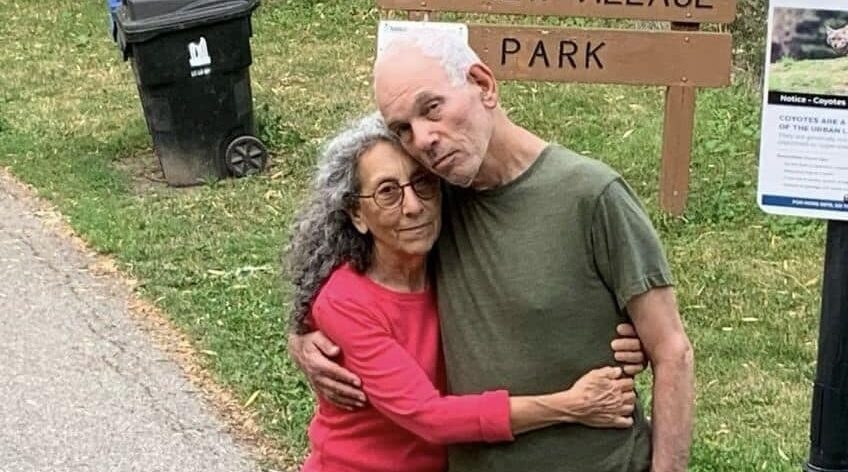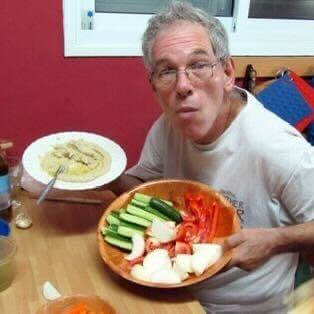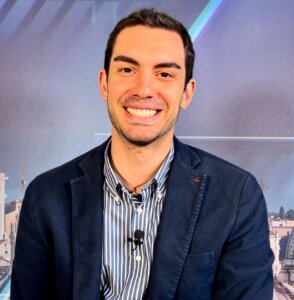‘The last person to be any kind of threat’: 2 Israeli-Americans missing since Oct. 7 confirmed killed in Hamas attack
Judith Weinstein and Gadi Haggai were taking their regular morning stroll when Hamas attacked

Judith Weinstein, left, and Gadi Haggai, right, in an undated photo. (Courtesy/Hostages and Missing Families Forum)
Two Israeli-Americans missing since the Oct. 7 Hamas attack on Israel have been confirmed killed, their kibbutz announced.
Judith Weinstein, 70, a member of Kibbutz Nir Oz, was fatally wounded during the terrorist invasion of southern Israel, Nir Oz said on Thursday. The statement confirmed her death, but did not say if she had died the same day.
Last week, the Hostages and Missing Families Forum, a volunteer group that represents Israelis held captive by Hamas, said Weinstein’s husband, Gadi Haggai, 72, had been killed.
Their bodies are being held in Gaza. Before the news of their deaths, their family had hoped they were still alive while in captivity.

The kibbutz and hostage advocacy group did not provide information on how the couple’s deaths had been determined. Their deaths were confirmed by Israel’s Government Press Office, an official government body that coordinates between the Israeli government and media.
On the morning of Oct. 7, Weinstein and Haggai left Nir Oz to take their routine morning walk through the fields and orchards around the kibbutz. Security camera footage showed the pair walking out of a kibbutz gate shortly after 6 a.m. The attack started around an hour later.
During the Hamas attack, Weinstein sent a message to friends saying that she and Haggai had been wounded by gunfire, the Hostages and Missing Families Forum said. Weinstein also called the Magen David Adom emergency response corps after the couple had been wounded.
“They came on the road,” Weinstein, referring to the terrorists, said during the call, according to Israel’s Channel 12 news. “There were a lot of motorcyclists with live weapons and they shot us. We lied down and they shot me in the face and hand.”
Weinstein (referred to as “Judih” in some reports) was born in Goshen, New York and moved with her family to Toronto when she was 3. She also held Canadian citizenship, the Canadian Broadcasting Corporation reported.
Four decades ago, she and her cousin Ariel Duckler Levy moved to Israel. “My lifestyle brought me to the very metropolitan and wonderful city of Tel Aviv, which is vibrant, full of art and full of business,” Levy said in an interview with the Forward, while Weinstein chose “a very rural, pastoral kibbutz lifestyle to have her children and raise them.”
Weinstein was an English teacher for special needs students at the Nofei Habsor high school in the neighboring community of Magen. She also taught children to cope with anxiety caused by the conflict through meditation and mindfulness, said the Eshkol Regional Council, the local governing authority.
She had unique methods for engaging her students, including by building handmade puppets out of discarded jewelry and clothes she collected on the kibbutz.
At weekly demonstrations in Tel Aviv organized by the hostages’ relatives, Levy said, many people approached her who knew Weinstein “from her teaching of English for all those decades, or her teaching of Qigong, or yoga, or meditation or mindfulness.” All she wanted, she said, was to “see Judih and take a walk with her, talk about and make art with her, and make food with Gadi, altogether with all of our children and grandchildren.”
Haggai, whose mother was born and raised in Manhattan and whose father is from Detroit, was a flute player and composer who performed in a military band during his Israel Defense Forces service. He worked as Nir Oz’s dining hall chef. The couple met shortly after Haggai’s release from the military, while Weinstein was volunteering on Kibbutz Ein Hashofet, Haggai’s hometown, Nir Oz said.
The pair performed together around Israel in a music ensemble called Jazz Alliance, the kibbutz said, describing them as a dedicated couple who “couldn’t be more perfect for each other.”
The couple had four children and seven grandchildren.

“When Gadi retired, he started to cook at home for Judih,” Levy told the Forward. “She stopped cooking and took a photograph of the food that Gadi made for her, posting everyday on an Instagram account she created for him.”
“Their whole life was about just being healthy, being outdoors and enjoying nature and music, meditation, art, enjoying their grandchildren and their friends,” she said. “If there was anybody that would be the last person to be any kind of threat to Gaza, it’s them.”
The couple’s daughter, Iris Haggai Liniado, mourned her parents in a Facebook post on Thursday. She described her frantic search for her parents’ whereabouts after the attack, but said she had suspected her mother had been killed because Weinstein was an elderly woman who was not released with other hostages in an exchange deal last month. Liniado said she realized her mother had been killed when she was informed that Haggai was dead.
“There isn’t a second of the day that I’m not in Oct. 7,” she wrote. “I need to process that I don’t have a mother and a father anymore. That I won’t hear your voices anymore.”
“What an inspiration you were together. You completed each other,” she wrote, adding that news of their deaths had at least brought the family some closure.
Liniado criticized Israeli Prime Minister Benjamin Netanyahu, saying he had not spoken to her, while President Joe Biden had spoken with her twice.
Biden said in a statement last week that he was “heartbroken” by news of Haggai’s death.
Israeli authorities believe 129 hostages remain in Gaza, not all of whom are alive. Last month, 105 captives were released from Gaza during a brief truce. Four other hostages were released before the truce, and one was rescued by Israeli forces.
Nir Oz was one of the hardest-hit communities in the Hamas attack, with around 80 of its 400 residents taken hostage and 25 killed during the attack.
Parts of this article originally appeared on JTA.org.
















